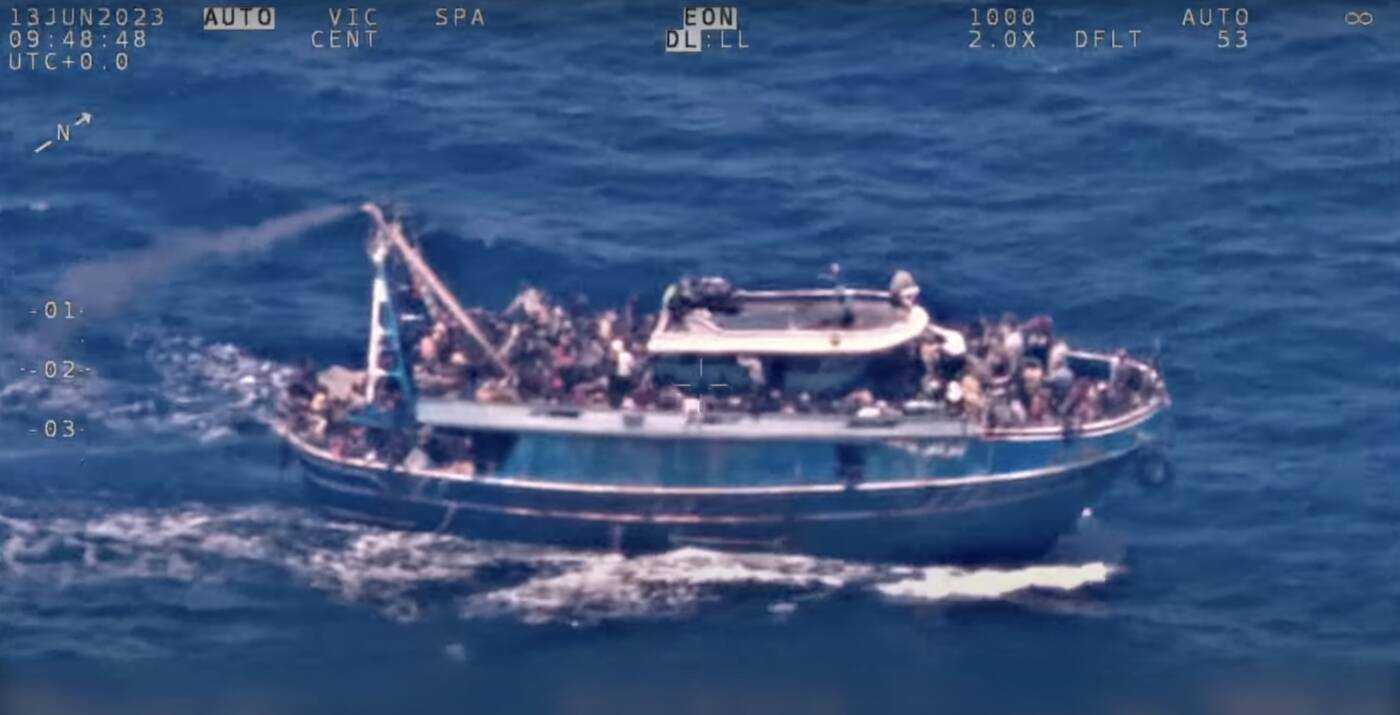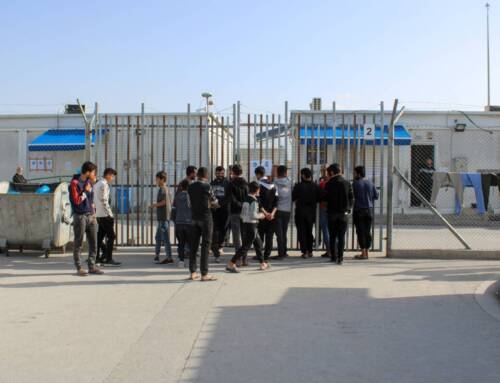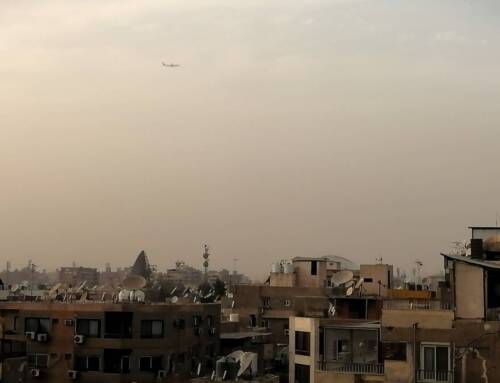Syrian authorities stall identification efforts as Pylos shipwreck families struggle for answers
One month after the Pylos shipwreck, only 25 of 82 bodies recovered from the sea have been identified—a challenging process that requires DNA samples to be collected across multiple countries. In Syria, authorities have still not authorized DNA collection from relatives of the missing.
14 July 2023
ATHENS — On Tuesday, three Syrian families gathered at an Islamic cemetery in Komotini, northern Greece. They were there to bury three men: Riyadh Ghassan al-Talab, Muhammad al-Suwaydan and Hussam Zatima.
Al-Talab, al-Suwaydan and Zatima, all from Syria’s southern Daraa province, were among the estimated 750 people on board a boat that sank in Greek waters near Pylos on June 14, in the deadliest migrant shipwreck in the Mediterranean since 2015. Only 104 passengers survived.
Out of 82 bodies recovered after the sinking, 25 people have been identified so far—including five Syrian nationals—Pantelis Themelis, Commander of the Hellenic Disaster Victim Identification Team, told Syria Direct. So far, Greek authorities have opened 500 missing persons files.
Survivors estimate 150 Syrians were on the boat, roughly 110 of whom did not survive. One month after the sinking, the three Syrian families that buried their loved ones in Komotini this week are among the few who have been able to lay their loved ones to rest.
Identifying the victims is a challenging process that requires DNA samples to be collected across multiple countries. So far, only 10 Syrian families have been able to submit DNA samples by traveling to Greece or sending their results via a certified laboratory in European countries. In Syria, the Damascus government has not authorized DNA collection.
Facing an uphill battle to confirm their relatives’ fates and provide DNA, hundreds of family members living in Syria and neighboring countries are left wondering if their loved ones are lying in a Greek morgue, or still missing in the deepest part of the Mediterranean.
Forensic work
To identify the 82 recovered bodies, Greek authorities follow international standards and rely on fingerprints, DNA, and dental records, Themelis explained. Due to the time the bodies stayed in the water, facial recognition “is not acceptable as an identification method, because they look very different from the photos,” he added.
Kathryne Bomberger, Director-General of the International Commission on Missing Persons (ICMP), agreed visual methods are not enough. “Err on the side of using DNA, because migrants may switch clothes or ID cards,” she said.
The International Committee of the Red Cross (ICRC) has been helping Greek authorities collect information from the relatives of the missing. In disasters where “bodies have undergone post-mortem changes (like decomposition and disfigurement) prior to recovery from the sea, forensic experts require primary methods of identification such as fingerprints, DNA and dental examination,” Antonietta Lanzarone, an ICRC forensic doctor, said. Relatives’ distress can result in “wrong visual identifications,” she added.
The Hellenic Disaster Victim Identification Team has been comparing photos and physical descriptions provided by families of the missing with their own images and autopsy data. If they believe there could be a match, Greek authorities contact the family and request a DNA sample from “first-degree relatives, such as a father, mother and children, but not the brothers,” Themelis said.
Many of the victims are Pakistani and Egyptian nationals, and their respective governments are collaborating with Greek authorities. Pakistan has already sent in nearly 200 DNA samples, Themelis said.
But Syrian authorities have not been responsive. “We don’t have the authorization by the Syrian government to collect the DNA samples in Syria,” Themelis explained. In Damascus-controlled areas, “Red Crescent and the Red Cross have people on the ground ready to collect DNA data, but they are not able until today because they don’t have the authorization of the Syrian authorities,” he added.
Syria Direct reached out to the Syrian embassy in Athens for comment, but did not receive a response by the time of publication.
“ICRC has been coordinating with different embassies, such as [those of] Pakistan and Syria, to provide technical instructions to facilitate and ensure that the disaster victim identification procedures are understood and followed,” said Sebastian Bustos, a delegate with the ICRC’s Restoring Family Links program.
For families reluctant to contact the Syrian embassy, “ICRC is urging them to contact the Red Cross, Red Crescent National Societies or ICRC Delegations in the country where they are,” he added. So far, ICRC has received 136 tracing requests from relatives in Syria, Pakistan, Jordan, Germany, Italy, Denmark, the Netherlands, Switzerland and the United Kingdom.
Syrian authorities need to allow a third party to collect DNA because Syria does not have a certified lab that could check DNA and send the results to Greek authorities. “If the Syrian authorities had a certified DNA lab it would be much easier to have the results,” Themelis explained.
ICMP has a Syria program working to clarify the fate of the 150,000 missing due to the conflict. “We have already collected data from over 70,000 families of the missing, so in the case of at least the Syrian migrants, we could help in linking the identity,” Bomberger said. Her organization offered to aid Greek authorities “immediately” after the shipwreck, but received no response. “We are on standby, we are here to help,” Bomberger said.
Themelis said Greek authorities did not take up the offer because ICMP “didn’t have people on the ground in Syria” ready to collect genetic data from the relatives. Bomberger acknowledged that collecting new data in Damascus-controlled areas would be “a big conundrum.” However, ICMP does have a presence in northeastern Syria, where some of the victims are from.
For Syrian families living in Jordan or Iraq, Themelis said his team is awaiting a response from the two countries’ authorities in the next few days. On July 6, the Palestinian embassy in Syria announced that Syrian-Palestinian refugees could go to the ICRC office in Damascus to provide a DNA sample.
Syrian activists have organized the Justice for the Boat Victims, a collective that includes 34 Syrian survivors and more than 200 Syrian families. “Until now the Syrian authorities have not even contacted the families of the victims,” Hamzah Fheed, one of the activists involved, said.
For Syrians unable to afford to travel or obtain a visa to go to Greece to provide DNA, Fheed demanded Greek authorities to “ease the process” to obtain DNA samples and grant them a special travel permit “so the family can know if their son is among the dead.”
Similarly, ICRC forensic doctor Antonietta Lanzarone said Greek authorities should consider providing “humanitarian visas allowing families of dead migrants to visit the burial site and pay their respects, as well as facilitating or supporting the repatriation of remains.”
Themelis argued this was “not the solution,” however, because “you have thousands of relatives around the world. The solution is to facilitate the DNA sample procedures in their country.”
Frustration among families
Odai Abo Sham, a Syrian living in the UK, had two brothers on the boat that sank on June 14. One survived, while the body of his younger brother—Riyadh al-Talab—was identified after Odai traveled to Greece to provide a DNA sample.
Abo Sham declined to speak with Syria Direct, but he is part of Justice for the Boat Victims, and is in contact with Fheed, who said for two weeks Greek authorities insisted Odai contact the Syrian embassy in order to receive his brother’s body.
“Greek authorities told Odai he had to go to the Syrian embassy in Athens, he told him there was no way he would go because he is a political refugee and fled the regime,” Fheed explained.
For Syrian refugees who fled the repression of the Syrian security apparatus, embassies are a hostile place. The Syrian Justice and Accountability Center (SJAC) published a report in May analyzing 14,108 pages of Syrian embassy documents that concluded that embassies were used to spy and surveil Syrians abroad perceived as opposing the Assad regime.
For bodies to be repatriated to Syria for burial, “we have to send documentation to the Syrian embassy—it’s international legislation, we can’t avoid that,” Themelis said. If families decide to bury their relatives in Greece, “they don’t need to deal with the Syrian embassy.”
On June 25, Odai took to social media to express his frustration with what he called Greek authorities’ “mistreatment” of victims’ families. He and the relatives of two other shipwreck victims ultimately decided to bury their loved ones in a Muslim cemetery in northern Greece at their own expense. Themelis said Greek authorities had offered to pay for burial in a mixed cemetery with a section for Muslims, but the families opted to bury them in a Muslim cemetery.
“The ICRC is and will continue to follow the process closely with the Hellenic Authorities to ensure that, for those who have been identified, the wishes of the families are duly taken into consideration, including for the probable faith and customs of the person,” Bustos said.
Greek authorities have covered the cost of chemical procedures, death certificates and coffins, but they are not covering the repatriation flights. Pakistani authorities are paying for flights to repatriate their nationals, he added.
Two families of identified victims want to send the remains of their loved ones back to Syria, Themelis said. But Fheed expected most Syrian families to bury their relatives in Greece because repatriation could cost up to $5,500.
The right to know
Adham Farouan, a 37-year-old eye doctor living in Germany, is among the hundreds of families with no concrete proof of their relatives’ fates. Wihad, his 16-year-old nephew, and Qusayr, his 19-year-old cousin, were both on the boat when it sank off Pylos.
The two young men fled Daraa two weeks before embarking from Libya on their ill-fated journey in mid-June. In Daraa province, insecurity, lack of work and military conscription are the main drivers forcing Syrians to flee, Farouan said. “With military conscription, families know their son will kill or will be killed, and they will be returned a body,” he added.
Farouan was frustrated by the slow response of Greek authorities and organizations involved in the process of registering and identifying the missing. “I sent emails to the Red Cross and no one replied to me,” he said. He opened a missing persons file, but no match has resulted from it. “They said once we have an update we will inform you, but until now they didn’t,” he said.
“We appreciated the activists on Facebook that gave us these names and told families if their sons were alive,” Farouan said. A list with the names of 104 reported survivors circulated on social media in the days after the sinking, while Greek authorities told relatives at the time they did not have a final list, he added.
Themelis acknowledged that the list of survivors and the missing took time due to possible mistakes when writing Arabic or Urdu names in Greek. He also noted their list of the missing could include duplicates if multiple family members opened a file for the same person.
Accountability
Thirteen Syrians from Inkhil, Farouan’s hometown in Daraa, were on the boat. Only three survived. “I talked to the three survivors and they all told me it was clear the Greeks sank them,” Farouan said.
Syrian survivors also told Syria Direct last month that the Hellenic Coast Guard caused the boat to capsize after they tied a rope to their vessel, and then sailed away neglecting their duty to provide a swift rescue. The Guardian and other media investigations have also suggested that the Greek coastguards were responsible for the sinking.
Farouan does not trust Greek authorities to investigate the incident. “Why is there not a European committee investigating?” he asked. Fheed, from Justice for the Boat Victims, also called for an international investigation, and for “the protection of the survivors in Greece and their testimony of what happened.”
Survivors and relatives have the “right to justice, right to the truth and rights to reparation,” Bomberger explained. Cases of missing migrants “should be subject to the same principles of investigation and same efforts to identify them” as any other disappearance, she said, regardless of their national or citizenship status.
“The same principles should apply to everyone, and that’s clear under the law,” Bomberger added.
Only 13 percent of 20,000 missing are found
The sheer scale of the Pylos shipwreck has garnered expressions of “profound sorrow” by some of the same European political actors invested in migration policies that block the work of NGO boats rescuing migrants in distress at sea. The European Union has also funded the Libyan coast guard to stop irregular migration. This past week, Libyan authorities were caught on video allegedly firing at the NGO boat Ocean Viking while it was on a search and rescue operation.
The Mediterranean Sea is the deadliest migration route in the world. Since 2014, more than 20,000 people have died and gone missing while trying to cross.
Between 2014-2019, 2,609 bodies of people trying to cross the Mediterranean were found in the sea and buried in Greece, Spain and Italy. This accounts only for 13 percent of the missing. Out of the 2,609 bodies recovered, the rate of forensic identification varies by country: Greece has only identified 33 percent of the buried, while Spain identified 50 percent and Italy 73 percent.
Thousands of families are left in the agony of not knowing where the remains of their loved ones are. “The capacity right now within these European states to identify large numbers of missing persons doesn’t exist in the manner that is going to meet the needs of tens of thousands of missing persons,” Bomberger said, while calling for a sustainable strategy to collect DNA data.
Since 2018, the ICMP has been working with Greece, Cyprus, Italy and Malta to form a Joint Process to account for missing migrants: building up the countries’ DNA and forensic capacities, as well as their ability to share data both between states and between states and international organizations.
“I do not think it should be this complicated to create this type of sustainable process,” Bomberger said. “It just requires political will.”
Like hundreds of others, Farouan is trapped in unresolved grief, with no closure about his missing nephew and cousin. “We don’t know if they died or are alive. Their parents in Syria contact me and cry. It is a disaster,” he said.
“If we knew they died, we would grieve…but we live in uncertainty,” Farouan added.







